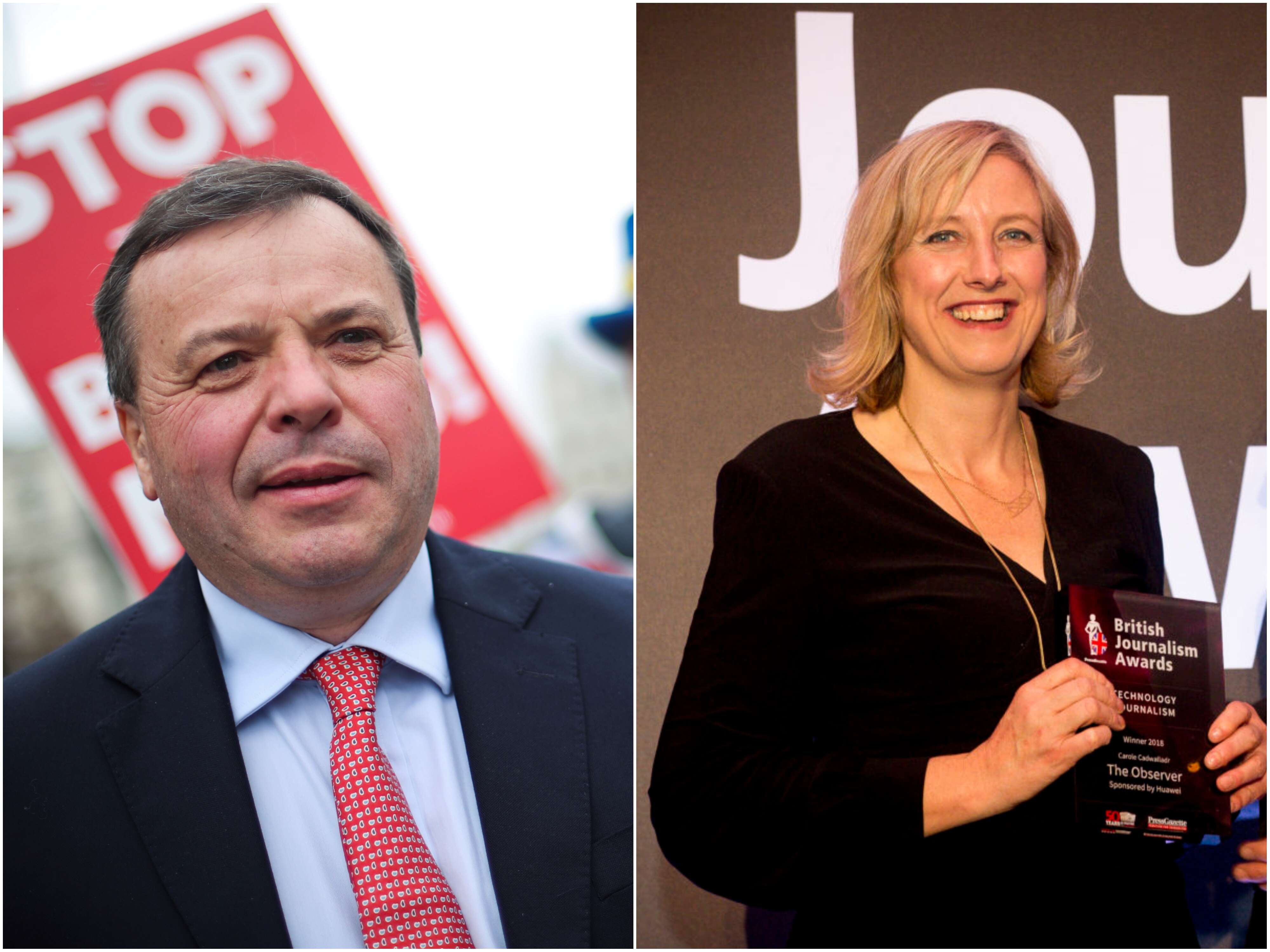
The Observer’s Carole Cadwalladr has said she is confident of winning a libel case brought by prominent Brexiteer Arron Banks.
Cadwalladr (pictured, right) and her lawyers have responded to the lawsuit today, calling it “wholly without merit” and an abuse of process. She has also threatened to counter-sue for harassment.
Leave.EU co-founder Arron Banks (pictured, left) objects to claims made by Cadwalladr in two recent speeches that he was offered money by the Russian Government and had lied about his relationship with the regime.
Banks has always denied receiving money from Russia.
Leave.EU communications director Andy Wigmore told Press Gazette Banks’ lawsuit was about preventing Cadwalladr from continuing “to make assertions which are factually far-fetched and just not true”.
The journalist said her legal team, which includes media lawyer Gavin Millar QC, will contest that her remarks were true and in the public interest under the Defamation Act 2013 if Banks continues to pursue the case.
Cadwalladr has won recognition for her work exposing the harvesting of millions of Facebook users’ data by the now-defunct Cambridge Analytica and the wider impact of technology misuse on democracy.
She took home the Technology Journalism and Investigation of the Year prizes at the British Journalism Awards in 2018.
Banks, through lawyers Kingsley Napley, warned Cadwalladr in a letter last month that defamation proceedings would be issued against her seeking damages and an injunction unless she gave a “prompt and satisfactory” response.
On Friday, Banks formally filed the case at the High Court, claiming an “unlimited” amount in damages and £10,528 in court fees plus legal costs to be confirmed.
Ravi Naik, also representing Cadwalladr, responded to Banks’ claim today in a letter seen by Press Gazette which said neither of the statements complained of were defamatory.
They relate to event in Westminster on 4 June called The Convention: Never Again, at which Cadwalladr made a keynote speech, and at the journalist’s Ted Talk made in April. Both can still be viewed online.
The “only natural and ordinary meaning” of the statement from the Westminster speech is that Banks “was offered (not that he accepted) money,” the letter said.
“This is an entirely neutral statement. It is neither negative nor positive.
“There are many reasons that the Russian government – or any government – may want to offer money, particularly to a well-known businessperson such as your client.”
Regarding the Ted Talk, Naik said Cadwalladr’s words meant Banks had “provided misleading and conflicting accounts of his relationship with the Russian government”.
“This is however factually correct,” the letter said. “Mr Banks admitted to providing inconsistent statements about how often he met with the Russian government.”
The letter also states that Banks has offered no evidence of serious harm to his reputation, which was ruled necessary for defamation action in a Supreme Court ruling last month, and that the claim was filed before Cadwalladr had the necessary time period to respond.
Cadwalladr told Press Gazette Banks’ claim was “frivolous and vexatious” and that despite offers of crowdfunding support she would rather people spend their money on funding “more research and investigation into what he and others are doing and did during the referendum”.
She added: “We are very confident they have no case. We can defend this on the basis of absolute truth and of public interest. We know that we can win.”
Cadwalladr also claimed Banks was “trying to use litigation as a weapon against me to harass me and stop me doing journalism”.
Naik’s letter stated that “as these proposed proceedings are devoid of credibility, the only true intention of the claim is to cause our client anxiety, alarm and distress”.
It went on: “As such, should your client continue with these unmeritorious proceedings, our client will counter claim against your client for harassment.”
Wigmore told Press Gazette: “Arron has always been a firm believer in press freedom and creative freedom but there comes a point when a line is crossed and the press has to recognise that with freedom also comes a responsibility, especially when it comes to the truth.
“This is not about shutting a journalist or an organisation down, it’s about ensuring they report accurately and fairly and in Carole’s case she continues to make assertions which are factually far-fetched and just not true.”
Wigmore revealed that more claims will be issued later this week against Channel 4 News, the Observer and BBC Newsnight and other unnamed individuals who he said continue to repeat as fact that Banks was funded by the Russians, that the Russians paid for Brexit, and that the sources of his money were illegitimate.
A case will also be launched against Netflix if the upcoming documentary The Great Hack, which will examine the Cambridge Analytica scandal, repeats claims made by Cadwalladr relating to Leave.EU’s relationship with the data firm.
“The cases are very simple – if the person or organisation has evidence of fact then they can present this evidence to a court, if they have then Arron will lose his actions,” Wigmore said.
“If they haven’t, which we know to be the case, then we will let a court decide, they will lose, be forced to correct those allegations and pay compensation.”
Any compensation awarded in any claims won by Banks will be donated to Nigel Farage’s Brexit Party, Wigmore said.
Picture: Reuters/Hannah McKay and Press Gazette
Email pged@pressgazette.co.uk to point out mistakes, provide story tips or send in a letter for publication on our "Letters Page" blog
